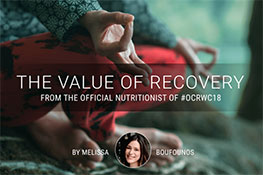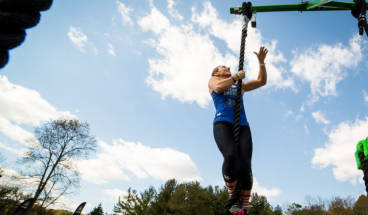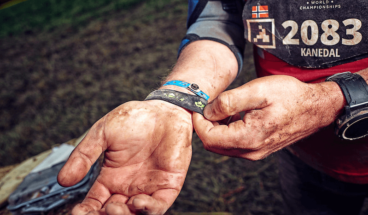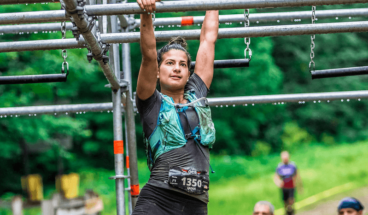
The Best Post-Race Recovery Tips
As an obstacle course racing (OCR) athlete and Certified Holistic Nutritionist specializing in nutrition for OCR athletes, I am a member of over a dozen Facebook groups of OCR athletes and I see a lot of interesting conversations. I see everything from favorite gear to favorite race day food to training tips to race stories to overall camaraderie and motivation. There’s one conversation I am not seeing enough of though, and that’s post-race recovery.
Instead, I see a lot of the opposite:
- “No rest for the wicked”
- “Champions never rest”
- “I have bronchitis. Should I rest or run?”
- “Rest day? What is that?”
- “I failed my rest day today”
- “I’m on a 181-day running streak and don’t know what a rest day is nor need one”
- “I am lucky if I get 4 hours of sleep”
- “I wake up early to get in one workout and stay up late to get in another one”
These are all comments I’ve seen in the various groups I am part of. Maybe 20 percent of the time I’ll see an athlete say that they value rest and sleep as much as their actual workouts and that recovery is an integral part of their training plan. The truth is, when you don’t recover adequately (which also includes getting enough good quality sleep), your performance, body composition and health may suffer. Lack of recovery is quite complex, with a wide range of effects.
For some athletes this might mean increased inflammation, or their connective tissues aren’t healing. This can lead to acute or chronic pain or even injury. For other athletes this might mean their happy neurotransmitters are going down while hormones such as cortisol are going up. Cortisol is a hormone that is released from your adrenal glands in response to stress. Excessive levels of cortisol are associated with belly fat, poor sleep, brain fog, lower immunity, high blood pressure and high blood sugar.
Not balancing training with proper recovery leads to injury and illness.
If you neglect your recovery over extended periods of time, it can have serious physiological and psychological effects on you, which includes chronic injuries, hormonal disruptions as well as mental and physical health problems.
And did you know? You get fitter and healthier because your body properly rebuilds between workouts. You’re not getting fitter and healthier during your workout. Your workout is simply a stimulus for change, but it will only create results if you recover enough between workouts. If the demands you put on your body outweigh your ability to compensate, you will break down. Maybe not today, maybe not tomorrow, but down the road it will happen even if you feel invincible right now.
How do you know if you’re under-recovering?
Here are a few under-recovery signs to look out for:
- Elevated morning heart rate
- Muscles that are always sore
- Sickness
- Performance is stagnating or getting worse
- No appetite or a ravenous appetite
- Not sleeping well or can’t stop sleeping
- Feeling more depressed, anxious and crabby
On the other hand, if you are recovering well you will feel well-rested, energetic and vibrant; you will see an improvement in your performance; you will sleep better; you will have a strong immune system; you won’t have any injuries or nagging aches and pains; and you will have consistently good moods.
Last year, Amelia Boone joined forces with Caroline Burckle and Jonathan Levitt to create #restdaybrags and it’s one of my favorite social media hash tags. Amelia said the number one lesson she learned was that people don’t brag about rest days like they do their epic runs, and Rest Day Brags was born.
Better Post-Race Recovery
It’s important to balance stressful activities (yes, exercise is a form of stress) with relaxing and energizing activities. This can include meditation, reading, music, spa treatments, yoga, aromatherapy, warm baths, relaxing hobbies and meaningful relationships. Prioritize 30 minutes of relaxing activity each day.
Your training plan should include an adequate warm-up, mobility work, a cool-down, flexibility work and rest days.
While there is a place for active recovery days, rest is NOT active recovery. It is complete rest.
Cross-training and a variety of workouts are also important. Specific muscles and energy systems need a chance to fully recover. If you do endurance running day after day, you will deplete your oxidative system and your nutrient stores will likely not get replenished. It is a great idea to mix in low intensity exercise between higher intensity workout days to promote recovery.
On the nutrition front, consuming whole foods along with herbs and spices can help to moderate inflammation and assist in recovery.
Avoid under eating, especially if you are training more than 7 hours per week. This is especially key for female athletes who tend to cut calories too low for their activity levels. You also need to stay hydrated!
Aim for 7-9 hours of good quality sleep every night.
When you don’t sleep, your risk of getting sick increases and you’re at an increased risk of heart disease and other inflammation-related illnesses. Poor sleep can disrupt appetite regulation, making you feel hungrier and eat more, and is linked to excess body fat.
If your goals are to reach 23-25 percent body fat as a woman, or 13-15 percent body fat as a man you need to sleep at least seven hours per night. If you want to drop to 20-22 percent or 10-12 percent for women and men, respectively, you need to sleep at least seven to eight hours per night. And if you desire to be leaner than that, you need at least eight hours of sleep per night.
About Melissa
Melissa Boufounos is a Certified Holistic Nutritionist and OCR athlete who created MB Performance Nutrition to help OCR athletes improve their performance so they can finish faster, complete more obstacles and be proud of the results they’ve worked so hard for. As “The OCR Nutrition Coach”, Melissa believes in making sports nutrition less complicated and empowers OCR athletes to build the essential skills they need to sustain athletic performance, a lean and strong body, and health for life no matter what level of athlete they are, without extreme dieting or strict meal plans.
This post is meant for informational purposes only and does not replace the advice of your healthcare practitioner. Seek advice from your doctor before trying starting a new exercise practice or workout routine.
Sources:
https://www.precisionnutrition.com/all-about-recovery
https://www.precisionnutrition.com/all-about-sleep
http://www.precisionnutrition.com/all-about-cortisol
http://womensrunning.competitor.com/2017/03/just-for-fun/runners-bragging-rest-days_73386


